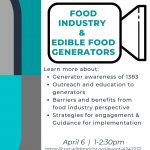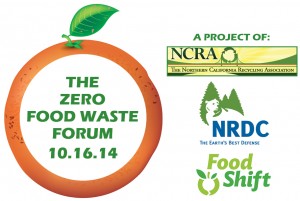Update in progress, 10/23
CCDEH Safe-Surplus-Food-Donation-
Crowd-Sourced Food Recovery Funding Matrix (available to committee members)
Zero Waste USA is the Zoom sponsor for the ZFWF webinars.

The CRRA Edible Food Recovery Technical Council calls are held quarterly on the 2nd Tuesday of the noted month, from 11am to 12pm. For more details, please click here.
The first Edible Food Recovery CRRA Technical Council Webinar was held November 17, 2020. Recording
Another Food Industry & Edible Food Generators was held April 6. See image at right.
NCRA Webinar #1 – 10/16/20
The first 2020 NCRA Zero Food Waste Forum webinar was held on World Food Day, October 16. The objective was to ferment collaboration across the region, to assist local agencies to meet Senate Bill 1383 goals and create more healthy and sustainable communities. Over 275 registered and more than 200 took part. The program featured:
-
- Countywide Edible Food Recovery – Jack Johnson, Senior Sustainability Specialist, County of San Mateo
- Food Bank SB 1383 Compliance Support – Becky Gershon, Senior Policy Advocate, California Association of Food Banks
- Hub Kitchen Program – Grace Liao, Food Recovery Manager, Berkeley Food Network
Recording Presentation Slides Flyer (pdf)
You may also be interested in attending the Zero Waste workshop at the free, online Climate Emergency Mobilization Summit on Friday, October 23rd featuring:
Yuka Nagashima, FoodShift
Sara Webber, Berkeley Food Network
The 1st Zero Food Waste Forum was held on October 16, 2014 – World Food Day, to recognize the unacceptable hunger that still exists around the world despite the large amount of good food that goes to waste. Known as the “Woodstock of Wasted Food” the forum featured international experts and models from across the U.S., Canada, and Europe.
The 2nd Forum was held on October 16, 2018 to help local jurisdictions understand the direction and intentions of Senate Bill 1383 (2016), which requires that no less than 20% of edible food currently disposed of in California is recovered for human consumption by 2025.
Now communities across region are accessing their needs and developing new programs for wasted food reduction and surplus food recovery.
As we bring the Zero Food Waste Forum online, our goal is to collaborate across the region and support each other as we meet the goals of Senate Bill 1383 and create more healthy and sustainable communities.
Our first quarterly session will feature:
- Food Bank SB 1383 Compliance Support – Becky Gershon, Senior Policy Advocate, California Association of Food Banks
- Countywide Edible Food Recovery – Jack Johnson, Senior Sustainability Specialist, County of San Mateo
- Hub Kitchen Program – Grace Liao, Food Recovery Manager, Berkeley Food Network
Event Flyer (pdf) Free Registration
Zero Waste USA is the webinar Zoom sponsor.
The webinar link is provided in the registration confirmation email.
ZFWF History
2018 – The second Zero Food Waste Forum was held October 16, 2018 in Berkeley, California, hosted by the Northern California Recycling Association and the Solid Waste Association of North America Gold Rush Chapter.
The purpose of the Forum was to help local jurisdictions understand the direction and intentions of Senate Bill 1383 (2016), which requires that no less than 20 percent of edible food currently disposed of in California is recovered for human consumption by 2025, and where we need to go. The Forum profiled successful policies and programs in food waste prevention and reduction and edible food repurposing and recovery, highlight regional and statewide examples and provide a forum for innovative approaches to reduce wasted food and feed hungry people. There was also break-out sessions in which participants were able to delve more deeply into these subjects with presenters and colleagues. 2018 Program (pdf)
2014 – The 1st Zero Food Waste Forum was held on Oct 16, 2014 (World Food Day) to recognize the unacceptable hunger that still exists around the world despite the large amount of good food that goes to waste. In the United States alone, 1 in 6 adults and 1 in 4 children are food insecure at some point during the year. That amounts to 50 million people impacted right in our own backyards. The day-long event targeted waste reduction professionals, students, schools, organizations, and businesses educate participants on the issues and potential solutions to the problem and how we all can work better together to reach Zero Food Waste. 2014 Program (pdf)




